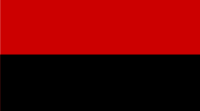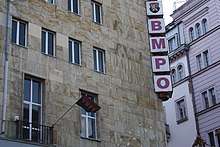IMRO – Bulgarian National Movement
The IMRO – Bulgarian National Movement or IMRO-BNM (Bulgarian: ВМРО – Българско Национално Движение, VMRO – Bulgarsko Natsionalno Dvizhenie) is a nationalist[2][3] political party in Bulgaria that was founded in 1991. It claims to be the successor to the historic Internal Macedonian Revolutionary Organization.[2] IMRO's leader is Krasimir Karakachanov.[7]
IMRO – Bulgarian National Movement ВМРО – Българско Национално Движение | |
|---|---|
 | |
| Leader | Krasimir Karakachanov |
| Founded | 1991 (cultural organisation) 1999 (political party) |
| Headquarters | 5th Pirotska Str, Sofia, Bulgaria |
| Newspaper | Bulgaria |
| Youth wing | National Youth Committee of IMRO |
| Membership (2016) | 20,000[1] |
| Ideology | Bulgarian nationalism[2][3] National conservatism[2][3] Social conservatism[4] Right-wing populism[5] Soft Euroscepticism[6] |
| Political position | Right-wing |
| National affiliation | United Patriots (until 25 July 2019) |
| International affiliation | None |
| European Parliament group | European Conservatives and Reformists |
| Colours | Red and Black |
| National Assembly | 11 / 240 |
| European Parliament | 2 / 17 |
| Party flag | |
 | |
| Website | |
| vmro.bg | |

History
The abbreviation IMRO refers to the Internal Macedonian Revolutionary Organization, a historic Bulgarian-led revolutionary political organization in the Macedonia and Thrace regions of the Ottoman Empire, founded in the late 19th century.[8] At the time of its establishment in 1991, the name of the organization was IMRO-Union of Macedonian Associations. At the Fourth Congress in 1997, IMRO-UMA dropped the addition UMA.[9] Initially, it was not involved in Bulgarian politics, but after 1994 it became politically active and entered the Bulgarian parliament. Renamed the IMRO-Bulgarian National Movement in 1998, the organization was gradually transformed into a right-wing populist political party in the 2000s.[10] In 2010, a group of its members split from the party and formed National Ideal for Unity.
In the 2014 European Parliament election, the party was part of the "Bulgaria Without Censorship", which included the parties Bulgaria Without Censorship, IMRO-BNM, People's Agricultural Union, and George's Day Movement. The coalition received 10.66% of the votes and won two seats in the European Parliament. MEPs elected from the coalition include IMRO vice-leader Angel Djambazki and BBT leader Nikolay Barekov.
On 3 August 2014 a coalition agreement between the NFSB and IMRO called Patriotic Front was signed for the upcoming parliamentary elections 2014.[11] And states its purpose to be for: "a revival of the Bulgarian economy, a fight against monopolies, achieving modern education and healthcare and a fair and uncorrupt judiciary." The signing of a coalition agreement between IMRO and NFSB marks the end of the BBT-IMRO coalition.
The members of the alliance are - PROUD,[12] National Ideal for Unity,[13] Middle European Class,[14] Association Patriot,[15] Undivided Bulgaria,[16] National Movement BG Patriot,[17][18] Union of the Patriotic Forces "Defense", National Association of Alternate Soldiery "For the Honor of epaulette",[19] National Movement for the Salvation of the Fatherland[20] and National Democratic Party.[21]
Ideology
The IMRO describes itself as a conservative and patriotic party based on modern nationalism. It defines itself as a "pan-Bulgarian national movement" aiming at "spiritual unity of the Bulgarian nation". It is known as a strongly nationalist and Orthodox Christian party[2] which claims to continue the mission of the historic IMRO and strives for the recognition of the Bulgarian character of the majority population of today's Republic of Macedonia.[22]
References
- "Само 344 000 членове стоят зад партиите в парламента" [Parties in Parliament only have 344,000 members]. 24 Chasa. 15 February 2016. Retrieved 23 October 2018.
- Christo Ivanov; Margarita Ilieva (2005). Cas Mudde (ed.). Bulgaria. Racist Extremism in Central and Eastern Europe. Routledge. p. 4. ISBN 0415355931.
- Nordsieck, Wolfram (2017). "Bulgaria". Parties and Elections in Europe.
- Norris, Pippa. Cultural Backlash and the Rise of Populism. Cambridge University Press. p. 240.
- Bechev, Dimitar (2009). Historical Dictionary of the Republic of Macedonia. Scarecrow Press.
Renamed IMRO-Bulgarian National Movement in 1998, the organization gradually transformed into a right-wing populist political party in the 2000s under the leadership of Krasimir Karakachanov
- Dandolov, Philip (2014). "The sinking fortunes of Euroscepticism in Bulgaria". Istituto per l'Europa Centro Orientale e Balcanica. Archived from the original on 17 September 2018. Retrieved 20 April 2018.
- "РЪКОВОДНИ ОРГАНИ". ВМРО.
- "Internal Macedonian Revolutionary Organization (IMRO)". Encyclopædia Britannica. Retrieved 27 February 2013.
- The A to Z of Bulgaria, Raymond Detrez, Scarecrow Press INC, 2010, ISBN 0810872021, p. 227.
- Historical Dictionary of the Republic of Macedonia, Dimitar Bechev, Scarecrow Press, 2009, ISBN 0810862956, p. 104.
- "НФСБ и ВМРО подписаха коалиция "Патриотичен фронт"". ВМРО.
- Слави Бинев закри ГОРД Archived 31 October 2014 at the Wayback Machine
- "Партиите "НФСБ" и "НИЕ" си стиснаха ръцете". potv.eu.
- "България - "Средна европейска класа" обяви "безкористна подкрепа" за програмата на НФСБ - Dnevnik.bg". www.dnevnik.bg.
- "България - Обединението около НФСБ включи и сдружение "Патриот" на бивши депутати от "Атака" (видео) - видео - Dnevnik.bg". www.dnevnik.bg.
- "СЕГА - НФСБ и "Целокупна България" се обединиха". SEGA Online. 5 September 2013.
- "НД "БГ патриот" подкрепя ВМРО". ВМРО.
- "Патриотичният фронт получи подкрепата на "БГ Патриот"". ВМРО.
- "Патриотични организации подкрепят ВМРО". ВМРО.
- "Национална телевизия СКАТ". skat.bg.
- НДП. "НДП СЕ ПРИСЪЕДИНИ КЪМ ПАТРИОТИЧНИЯ ФРОНТ". ndp.bg. Archived from the original on 3 September 2014. Retrieved 22 August 2014.
- Stefan Troebst. The Internal Macedonian Revolutionary Organization and Bulgarian Revisionism, 1923–1944. Territorial Revisionism and the Allies of Germany in the Second World War. Berghahn Books. p. 170. ISBN 085745739X.
External links
- Official website (in Bulgarian)
External links
![]()